北师大版(2019)选择性必修第一册Unit 1 Relationships Lesson 2 How Do We Like Teachers’ Feedback? 课件(共19张PPT)
文档属性
| 名称 | 北师大版(2019)选择性必修第一册Unit 1 Relationships Lesson 2 How Do We Like Teachers’ Feedback? 课件(共19张PPT) |
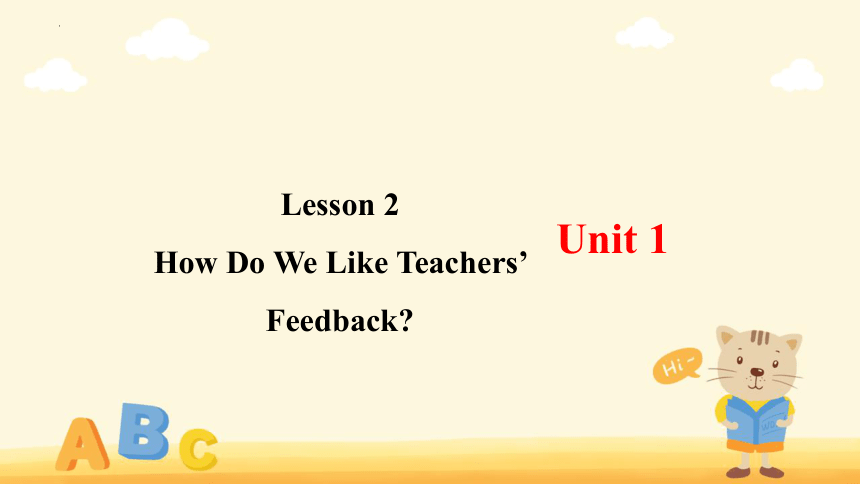
|
|
| 格式 | pptx | ||
| 文件大小 | 4.0MB | ||
| 资源类型 | 教案 | ||
| 版本资源 | 北师大版(2019) | ||
| 科目 | 英语 | ||
| 更新时间 | 2024-01-23 20:19:25 | ||
图片预览

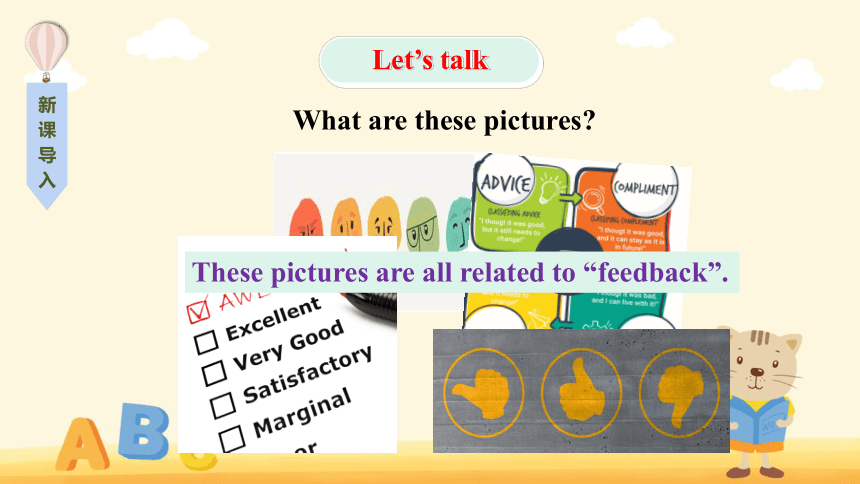

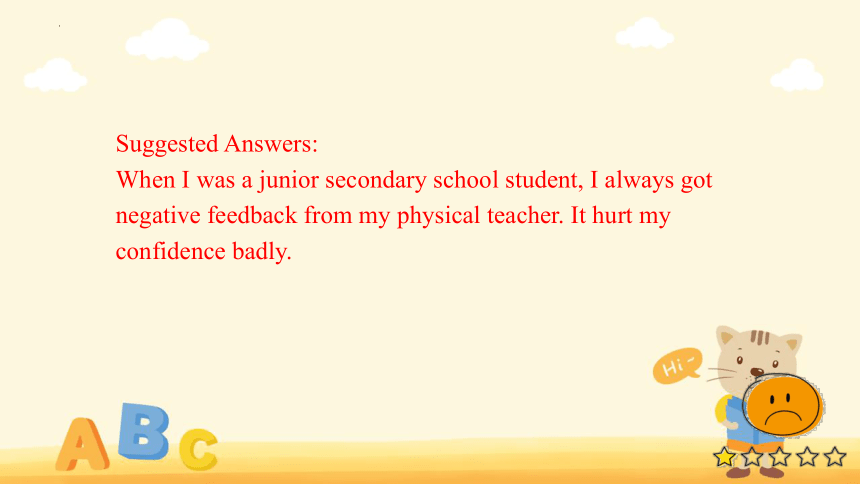
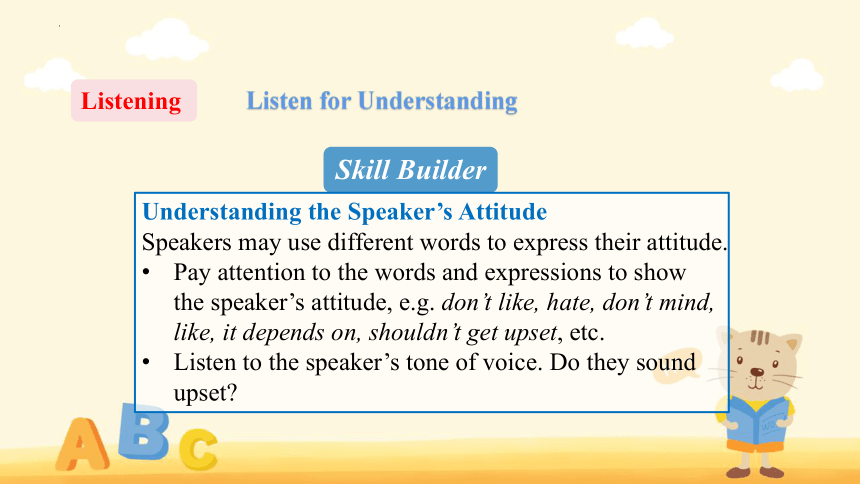

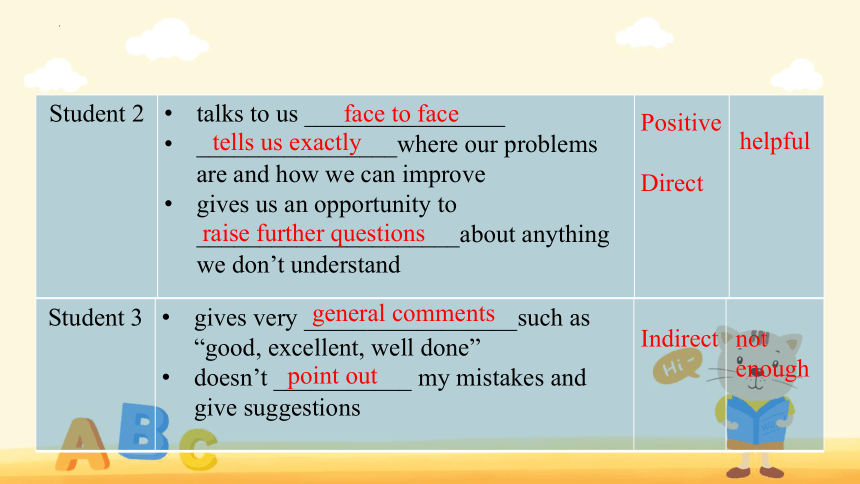
文档简介
(共19张PPT)
Unit 1
Lesson 2
How Do We Like Teachers’ Feedback
新 课 导 入
Let’s talk
What are these pictures
These pictures are all related to “feedback”.
课 堂 学 习
Pre-listening
Group Work. How do you feel when you receive teachers’ feedback Talk about your experiences and opinions. Use the phrases below to help you.
1
to go bright red to depend on personal preference
to be handled carefully to get upset
to feel hurt/ashamed/discouraged to feel encouraged/more confident
positive/negative feedback direct/indirect feedback
Suggested Answers:
When I was a junior secondary school student, I always got negative feedback from my physical teacher. It hurt my confidence badly.
Listening
Listen for Understanding
Understanding the Speaker’s Attitude
Speakers may use different words to express their attitude.
Pay attention to the words and expressions to show the speaker’s attitude, e.g. don’t like, hate, don’t mind, like, it depends on, shouldn’t get upset, etc.
Listen to the speaker’s tone of voice. Do they sound upset
Skill Builder
Three students are interviewed about their English teachers’ feedback for a campus radio programme. Listen and complete the information in the table.
2
How the interviewee’s teacher gives feedback Types of feedback Students’ reactions /feelings
Student 1 usually points out our _________ in front of the ___________
mistakes
whole class
Negative
feel quite hurt
lose confidence
1.3
Student 2 talks to us ________________ ________________where our problems are and how we can improve gives us an opportunity to _____________________about anything we don’t understand
Student 3 gives very _________________such as “good, excellent, well done” doesn’t ___________ my mistakes and give suggestions
face to face
tells us exactly
raise further questions
general comments
point out
Positive
Direct
helpful
Indirect
not enough
Group Work
3
1. Act out the interview in groups of four. Use the notes in Activity 2 to help you.
2. How many types of feedback have you noted down Sort them into different categories, e.g. positive and negative. Think of more feedback if you can.
Positive and negative feedback
General and specific feedback
Direct and indirect feedback
Complete the summary with the words from the listening.
4
Matt Dickson interviewed three students about their feelings of English teachers’ 1. __________. The first student thinks his teacher’s feedback is negative and makes him lose 2. ___________. But he understands her 3. _____________. The second student thinks the feedback from her teacher is more 4. ____________ even though it is more 5. ___________ for her teacher.
feedback
confidence
intention
effective
demanding
She can raise 6. __________ questions about anything she doesn’t understand. The third student thinks his teacher often gives very general 7. __________. But he wants to know where his 8. __________ and weaknesses are. He thinks feedback should be 9. __________. For example, the teacher can 10. ____________ his mistakes and say things like “You need to work on the past 11. ________.”
further
comments
strengths
specific
highlight
tenses
Focus on Function: Exchange Opinions
Listen to the conversation between two professors about giving teachers’ feedback to students. Find out their opinions and reasons.
5
Opinions Reasons
Professor Smith
Professor Jones
Try to give feedback in a less direct manner.
Understand some students’ feelings about direct feedback.
Negative feedback might hurt students’ confidence and interest in learning.
It is best to point out students’ problem directly.
Students need to get used to tough comments when they don’t do good work.
1.4
6
Listen and plete the Talk Builder.
Exchanging Opinions
1. ____ it is best to point out students’ problems directly.
2. Also, ____ they should realise that any feedback isn’t personal.
3. ____ you about that, but to be more helpful...
4. ____. Perhaps I should try that.
A. I see your point
B. I believe
C. I can agree with
D. I think
B
D
C
A
1.4
1. I feel / I (strongly) believe…
2. My opinion is…
3. Personally speaking, …
4. Speaking for myself, …
5. For me / From my point of view, …
6. As far as I know / I’m concerned, …
8. I’m sure that…
That’s good point, but……
7. To be honest…
Expressions of exchanging opinions
You could be right, but
I see your point, but
I share your ideas
I understand what you are saying, but…
I can agree with
Speak
7
Group Work. Choose three teachers who teach different subjects. Tell them what you liked about the feedback you have received from the past, and how you would like to receive their feedback in the future.
Key points
ashamed adj. 惭愧,羞愧,尴尬;因惭愧而不情愿
[归纳拓展]
be ashamed of sb./sth. 为某人/某事感到羞愧
be ashamed to do sth. 因惭愧而不情愿做某事
be ashamed that... 因……感到惭愧/内疚
[即学即练] 单句语法填空
1. We are often ashamed ______ our shortcomings, our mistakes and our failures. Remember, you are only human.
2. Tom was ashamed _________ (tell) his mother that he had failed the exam again.
of
to tell
preference n. 喜爱,偏爱;优惠,优待
n.偏爱的事物,最喜爱的东西
[归纳拓展]
have a preference for... 偏爱……
in preference to... 优先于……;而不是……
give (a) preference to... 给……以优惠;优待......
[即学即练] 单句语法填空
1. As for diet, Monica chooses vegetables and fruit _____________ any kind of meat.
2. For sustainable development, the government has decided to _________________ to those energy-saving and environment-friendly businesses in many aspects.
in preference to
give(a) preference
Can you say more sentences about exchanging opinions
Unit 1
Lesson 2
How Do We Like Teachers’ Feedback
新 课 导 入
Let’s talk
What are these pictures
These pictures are all related to “feedback”.
课 堂 学 习
Pre-listening
Group Work. How do you feel when you receive teachers’ feedback Talk about your experiences and opinions. Use the phrases below to help you.
1
to go bright red to depend on personal preference
to be handled carefully to get upset
to feel hurt/ashamed/discouraged to feel encouraged/more confident
positive/negative feedback direct/indirect feedback
Suggested Answers:
When I was a junior secondary school student, I always got negative feedback from my physical teacher. It hurt my confidence badly.
Listening
Listen for Understanding
Understanding the Speaker’s Attitude
Speakers may use different words to express their attitude.
Pay attention to the words and expressions to show the speaker’s attitude, e.g. don’t like, hate, don’t mind, like, it depends on, shouldn’t get upset, etc.
Listen to the speaker’s tone of voice. Do they sound upset
Skill Builder
Three students are interviewed about their English teachers’ feedback for a campus radio programme. Listen and complete the information in the table.
2
How the interviewee’s teacher gives feedback Types of feedback Students’ reactions /feelings
Student 1 usually points out our _________ in front of the ___________
mistakes
whole class
Negative
feel quite hurt
lose confidence
1.3
Student 2 talks to us ________________ ________________where our problems are and how we can improve gives us an opportunity to _____________________about anything we don’t understand
Student 3 gives very _________________such as “good, excellent, well done” doesn’t ___________ my mistakes and give suggestions
face to face
tells us exactly
raise further questions
general comments
point out
Positive
Direct
helpful
Indirect
not enough
Group Work
3
1. Act out the interview in groups of four. Use the notes in Activity 2 to help you.
2. How many types of feedback have you noted down Sort them into different categories, e.g. positive and negative. Think of more feedback if you can.
Positive and negative feedback
General and specific feedback
Direct and indirect feedback
Complete the summary with the words from the listening.
4
Matt Dickson interviewed three students about their feelings of English teachers’ 1. __________. The first student thinks his teacher’s feedback is negative and makes him lose 2. ___________. But he understands her 3. _____________. The second student thinks the feedback from her teacher is more 4. ____________ even though it is more 5. ___________ for her teacher.
feedback
confidence
intention
effective
demanding
She can raise 6. __________ questions about anything she doesn’t understand. The third student thinks his teacher often gives very general 7. __________. But he wants to know where his 8. __________ and weaknesses are. He thinks feedback should be 9. __________. For example, the teacher can 10. ____________ his mistakes and say things like “You need to work on the past 11. ________.”
further
comments
strengths
specific
highlight
tenses
Focus on Function: Exchange Opinions
Listen to the conversation between two professors about giving teachers’ feedback to students. Find out their opinions and reasons.
5
Opinions Reasons
Professor Smith
Professor Jones
Try to give feedback in a less direct manner.
Understand some students’ feelings about direct feedback.
Negative feedback might hurt students’ confidence and interest in learning.
It is best to point out students’ problem directly.
Students need to get used to tough comments when they don’t do good work.
1.4
6
Listen and plete the Talk Builder.
Exchanging Opinions
1. ____ it is best to point out students’ problems directly.
2. Also, ____ they should realise that any feedback isn’t personal.
3. ____ you about that, but to be more helpful...
4. ____. Perhaps I should try that.
A. I see your point
B. I believe
C. I can agree with
D. I think
B
D
C
A
1.4
1. I feel / I (strongly) believe…
2. My opinion is…
3. Personally speaking, …
4. Speaking for myself, …
5. For me / From my point of view, …
6. As far as I know / I’m concerned, …
8. I’m sure that…
That’s good point, but……
7. To be honest…
Expressions of exchanging opinions
You could be right, but
I see your point, but
I share your ideas
I understand what you are saying, but…
I can agree with
Speak
7
Group Work. Choose three teachers who teach different subjects. Tell them what you liked about the feedback you have received from the past, and how you would like to receive their feedback in the future.
Key points
ashamed adj. 惭愧,羞愧,尴尬;因惭愧而不情愿
[归纳拓展]
be ashamed of sb./sth. 为某人/某事感到羞愧
be ashamed to do sth. 因惭愧而不情愿做某事
be ashamed that... 因……感到惭愧/内疚
[即学即练] 单句语法填空
1. We are often ashamed ______ our shortcomings, our mistakes and our failures. Remember, you are only human.
2. Tom was ashamed _________ (tell) his mother that he had failed the exam again.
of
to tell
preference n. 喜爱,偏爱;优惠,优待
n.偏爱的事物,最喜爱的东西
[归纳拓展]
have a preference for... 偏爱……
in preference to... 优先于……;而不是……
give (a) preference to... 给……以优惠;优待......
[即学即练] 单句语法填空
1. As for diet, Monica chooses vegetables and fruit _____________ any kind of meat.
2. For sustainable development, the government has decided to _________________ to those energy-saving and environment-friendly businesses in many aspects.
in preference to
give(a) preference
Can you say more sentences about exchanging opinions
同课章节目录
- Unit 1 Relationshis
- Lesson 1 Teachers
- Lesson 2 How Do We Like Teachers’ Feedback?
- Lesson 3 So Close,Yet So Fa
- Unit 2 Success
- Lesson 1 Money vs Success
- Lesson 2 Top Five Secrets of Success
- Lesson 3 Getting to the Top
- Unit 3 Conservation
- Lesson 1 The Sixth Extinction
- Lesson 2 War on Plastic Packets
- Lesson 3 The Road to Destruction
